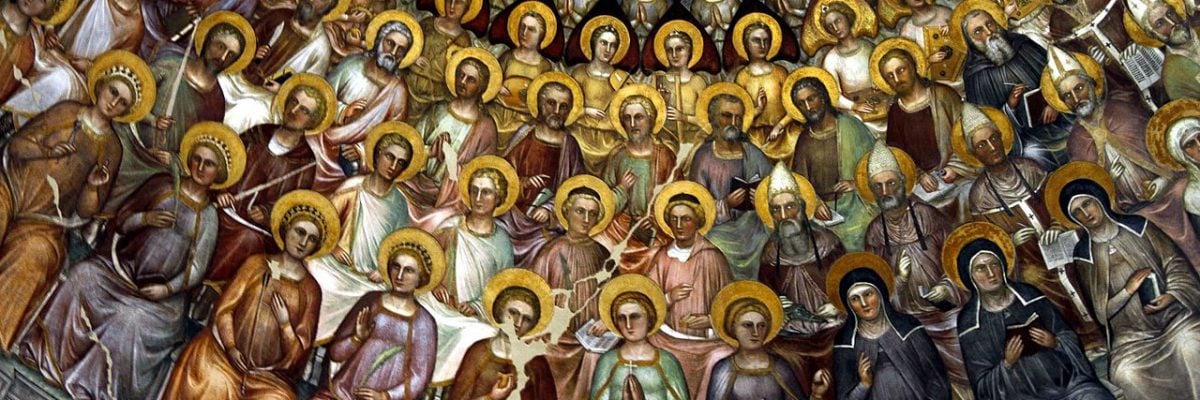
Homily for the Solemnity of the Ascension, 2018
Where the Head has gone before in glory, the Body is called to follow in hope.
-Collect for the Solemnity of the Ascension of the Lord
The days between the celebration of the Savior’s glorious ascension into heaven and the descent of his promised Holy Spirit on Pentecost—this Friday through the Saturday of the following week—have traditionally been held to be the original “novena” or supplication of nine days that Catholics pray in view of some special intention. Novenas are prayed to the Infant Jesus, to the Blessed Mother under her various names or titles, to St. Joseph, to St. Jude the Apostle, to St. Anthony, and to St. Thérèse of Lisieux, to name the most popular among Catholics of the Latin rite.
Whence did this custom of nine days arise? There is a historical explanation into which I will not enter here, because it does not suit our purposes just now. But there is a theological explanation that is very profound and sure and indicates why the novena is rooted permanently in the Lord’s Resurrection and entry into heaven.
For this we have to go back to Holy Saturday. On that day there occurred the most momentous event in the history of our human race since its creation and fall with our first parents Adam and Eve. As we profess in the Apostles Creed, “He descended into hell.” This does not mean the hell of the damned, of the reprobate, but rather of that state in which the just were still deprived of the vision of God. Our Lord descended to these souls and brought them the light of glory and the vision of the face of the Most Blessed Trinity, their essential happiness as human beings. These included Adam and Eve, Abel (the first martyr and the first man to die), and all the patriarchs and prophets and simple believers of the Old Covenant. He gave them the vision of his face. Of them he had spoken while he was yet preaching on the earth: “Other sheep have I who are not of this flock, these also must I lead.”
After his resurrection and his granting of the blessed vision to the departed, Our Lord spent forty days appearing to his faithful in Galilee and elsewhere. But on the day of his definitive departure and entry into his heavenly glory, he brought with him all those who were ready and to whom he had granted the reward of eternal life and future resurrection. This is the day of his ascension into heaven. He did not go alone, but rather brought with him all of those who from the foundation of the world had lived and given witness to the true God and his revelation.
Thus St. John XXIII taught in his homily on Ascension Thursday of 1962 that many of the dead rose from their tombs and appeared in the Holy City, and that among them we may piously believe were St. Joseph and St. John the Baptist and some of the prophets. Today’s feast is the sign that the Lord wants us to share in his divine fate, namely to be body and soul with him in the glory of heaven.
What does all this have to do with the novena before Pentecost addressed to the Holy Spirit of the Father and the Son? Well, if we take seriously the logic of Our Lord’s understanding of his Church, we will understand. Jesus does not want to be our Savior alone, he wants each Christian to join him in the work of redemption. Thus when he achieved his definitive triumph in heaven he did so in the company of all those he had saved from the foundation of the world, and whom he had liberated on the first Holy Saturday.
Today is the day when for the very first time the saints of the Christian religion appear in heaven before the throne of God able to intercede for us! Imagine the explosion of grace and goodness that came from all those countless grateful prayers! The novena to the Holy Spirit thus includes all the other lesser novenas whereby we ask for the help of one or another of God’s holy ones.
During the nine days of the first novena, the apostles and disciples and the Blessed Mother gathered in prayer. Surely the merit of this first preparation was mightily aided by the fact that the spirits of the just along with Divine Spirit were interceding for them and begging for the graces they were shortly and overwhelmingly to receive from the wounded and glorious hands of the risen and ascended Savior.
Let us never discount as mere folk tradition or—God forbid—superstition the practice of praying novenas to the Lord and his holy ones. For the novena indicates that we recognize the power of Christ crucified and ascended and the grace of his Holy Spirit and the happiness and power of our friends the saints.
The Church in our times has been eager to relate the practices of Catholic piety to the Paschal mystery. So if ever someone criticizes the practice of novenas as unenlightened or as out of step with the liturgy or as untheological, show them this reflection, and keep up your prayers!
Image: © José Luiz Bernardes Ribeiro / CC BY-SA 4.0



